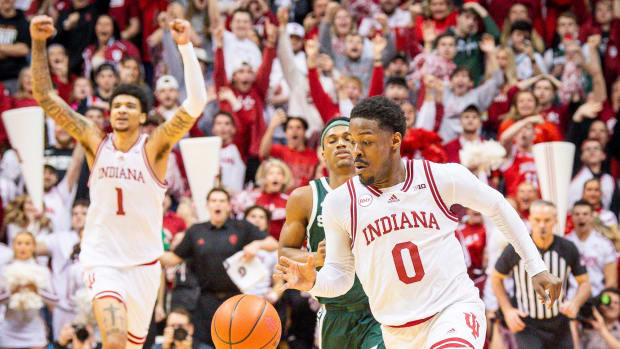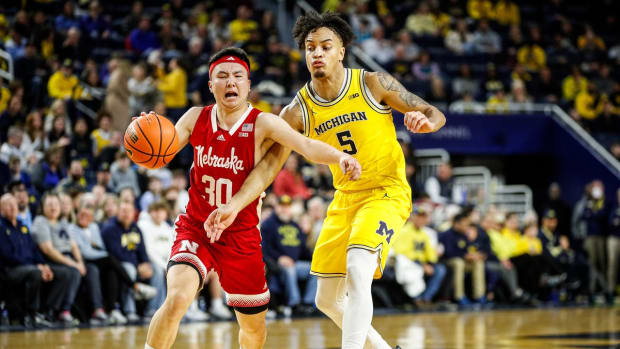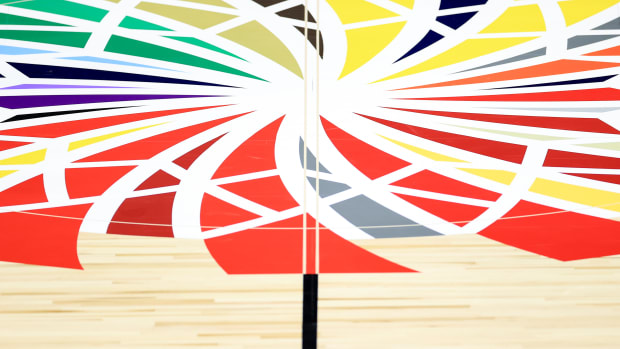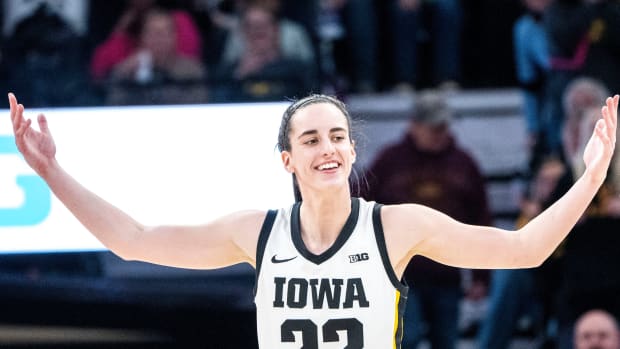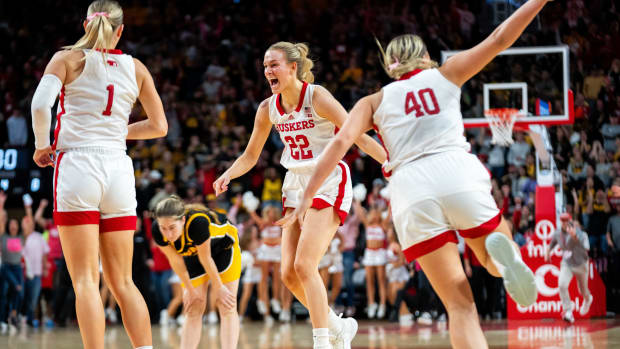Talking Points: Michigan Basketball Pre- & Post-Op Of The Battle 4 Atlantis
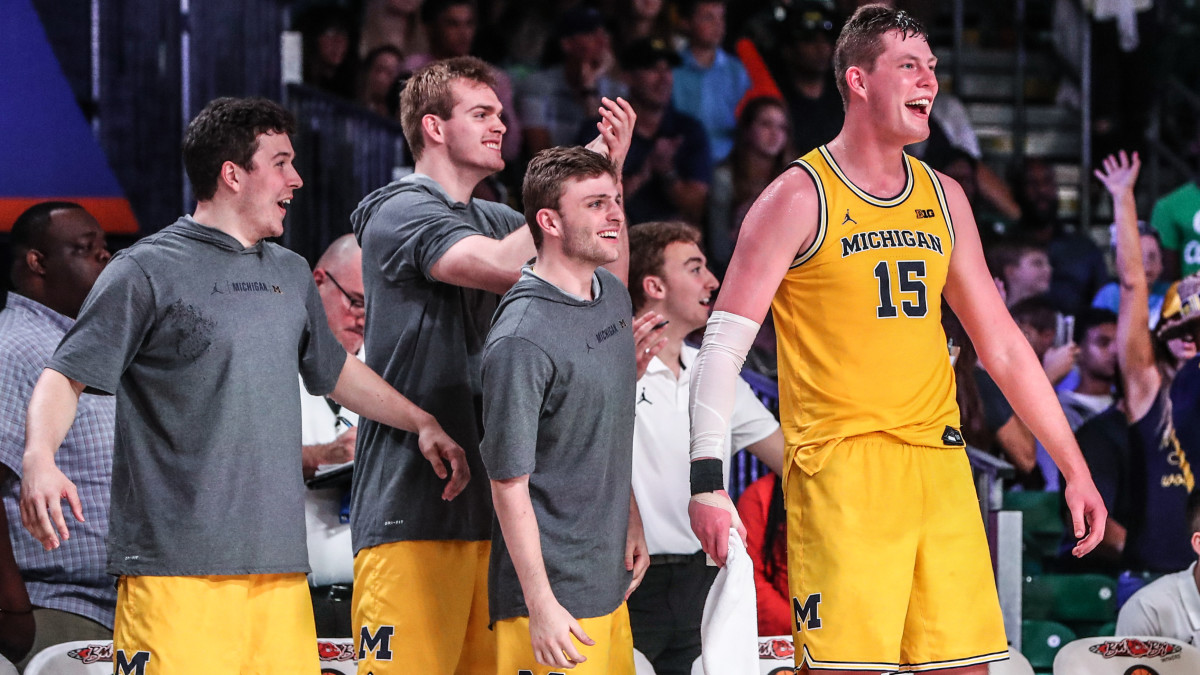
Michigan head coach Juwan Howard sat in front of media members prior to the Wolverines' Battle 4 Atlantis opener against Iowa State and pro-actively addressed the tournament's stiff competition, and where his squad fit in among the four AP top-15 teams in the bracket, before a single question was asked.
"Overall, I think this is going to be a great experience for our team to compete against high-level competition. We know it's a very challenging, tough tournament, but we're built for the competition. We're prepared for this."
While U-M has shown flashes of promise and potential early on in Howard's tenure, I don't think anyone outside of the Michigan locker room was prepared for what transpired in the Bahamas. In three resounding wins, the Wolverines proved that they are not only built for high-level competition, but quite possibly for a run to the Final Four and beyond.
Following the Maize and Blue's stunning destruction of the field at the 2019 Battle 4 Atlantis tournament, we delve deeper into some of the more notable quotes from the team’s pre and post-game press conferences in the Bahamas.
Sophomore center Colin Castleton, after the Iowa State game, on senior center Jon Teske:
“He’s the best big man in the country, in my opinion.”
To say that Michigan is better when Teske is on the court is an obvious statement, but just how much of a difference does he make?
Iowa State, objectively the least talented team that the Wolverines faced in the Bahamas, proved to be their most difficult out and the slimmest margin of victory. It was also a game in which Teske was limited to just 16 minutes because of foul trouble. The Cyclones outscored U-M 38-26 in the paint, a 12-point margin that was really the only statistic in which ISU held a discernible advantage.
Against two top-10 foes in North Carolina and Gonzaga, contests in which Teske averaged 33.0 minutes, Michigan won the low-post battle by an average score of 33-26 and the senior registered four blocks in each game.
The most comfortable victory of the tournament, against Gonzaga, was fueled by Teske’s best game—a 19-point, 15-rebound, four-block performance in which he limited the Zags’ starting center Filip Petrusev to just nine points on 4 of 16 shooting (25.0 percent). Heading into the Battle 4 Atlantis tournament final, Petrusev was averaging 17.0 points on 59.0 percent shooting. In his first eight games of the season, the sophomore from Serbia scored 15 or more points six times, including three games of at least 19 points, and was held to under 50.0 percent shooting only once. Without the comfort of this almost automatic production in the low-post, Gonzaga’s offense was stunted and it limped to just 64 points, more than 23 points lower than its 87.1 season average heading into its clash with the Wolverines.
For the tournament, Teske averaged 13.3 points, 9.7 rebounds, 3.0 blocks and 1.0 steals while shooting 58.7 percent from the field, including 62.5 percent from beyond the arc.
Head Coach Juwan Howard on the team’s ball movement and willingness to share the basketball, following U-M’s 73-64 triumph over North Carolina:
“Coach Beilein recruited guys that have high character, that are workers, and that are givers. I instill that in our players that we have to make each other better. When you look at the box score, you will see that it is balanced with shot attempts. You never see a guy with 20 attempts. You never see a guy on our team with 18 attempts—maybe one time, it may happen —but overall they do a really good job of sharing the game.”
‘Sharing the game’ is a common phrase found in many of Howard’s press conferences. It is also an ideology that has been ingrained into this year's Michigan squad, made apparent both on the stat sheet and when watching the Wolverines swing the ball around the perimeter, looking for that extra pass to spring an open shot.
The most shot attempts by a Wolverine in the Battle 4 Atlantis tournament was 15 by Teske against Gonzaga, in which he hit nine, and six different U-M players averaged at least 6.0 shot attempts during the tournament. Junior forward Isaiah Livers, who shot the ball 11.7 times per game, was the only Michigan player to average double-digit shot attempts in the Bahamas, with Teske and junior guard Eli Brooks both putting up 9.7 shots per game. Five different Wolverines averaged double-digit points during their championship run—Livers (16.7), Teske (13.3), Brooks (13.3), sophomore guard David DeJulius (11.3) and senior point guard Zavier Simpson (10.0).
Delving further into the statistics, Michigan assisted on 50 of its 92 field goals during the tournament (54.3 percent). By comparison, only 34 of 82 opponent field goals were generated by an assist (41.5 percent). Of U-M’s 238 points scored in all three games, 92 came in the paint (38.7 percent) and 99 came from beyond the arc (41.6 percent).
This notion of ‘sharing the game,’ and the Wolverines early-season ability to execute it, has not only spawned an offense with five capable and reliable scorers that opponents must account for (soon to be six once freshman guard Franz Wagner gets his legs under him), but a balanced attack that forces foes to guard all areas of the court.
Howard on defeating legendary UNC head coach Roy Williams after Michigan’s 73-64 victory over North Carolina:
“I’m learning. I’m learning from the best coaches in the league. Roy Williams is a coach that I respect a ton. I’ve watched his success that he’s had in college coaching. I’m always going to try to pick their brains, watch what they’re doing. I’m a rookie, what can I learn? I have that growth mindset of learning, and he’s one of those perfect guys you can learn from.”
For these three days in the sunny Bahamas, Howard was the teacher, offering cruel lessons to two of the games elite coaches in North Carolina’s Roy Williams and Gonzaga’s Mark Few. Add in Iowa State head coach Steve Prohm, and the first year Michigan head coach found himself up against 57 years of combined coaching experience and over 1,600 wins at the Division 1 level. By all appearances, he was far from intimidated, nor out of place.
U-M held all three of its opponents during its Battle 4 Atlantis title run to at least eight points below their season average, and limited both North Carolina and Gonzaga to its lowest single-game point total of the season. Michigan also outscored the average points yielded by its foes by at least six points in all three contests.
The Wolverines shot 50.0 percent or better from the field in all three wins, and limited all three opponents to under 44.0 percent shooting. During the tournament, U-M’s defense stifled shooters, with opponents hitting just 13 of 46 three-point attempts (28.2 percent), while its flowing offense created open looks that led to a sterling 47.1 shooting percentage from three (33 of 70).
The Wolverines led by at least 15 points in each game, including a 24-point lead over North Carolina, and were ahead by double-digits in for an eye-popping 71.6 percent of second-half minutes played.
Howard not only outcoached the three veterans on the other bench, the rookie schooled them.
Although UNC head coach Roy Williams did not defeat a top-10 team until his second-season as a head coach, then at Kansas, his 1989 Preseason NIT Run with Jayhawks does bear some striking similarities to the Wolverines 2019 tear in the Bahamas. KU entered the tournament unranked in the AP Top 25, but knocked off No. 2 LSU, No. 1 UNLV and No. 25 St. Johns to claim the pre-season tournament crown. The following week, they entered the polls at No. 4 and would claim the No. 1 spot on three separate occasions en route to a 30-5 record second seed in the NCAA Tournament. The season would ultimately end in a disappointing second-round exit at the hands of seventh-seeded UCLA.
What was most impressive to you? How much higher can this basketball team climb? Comment below!!!

